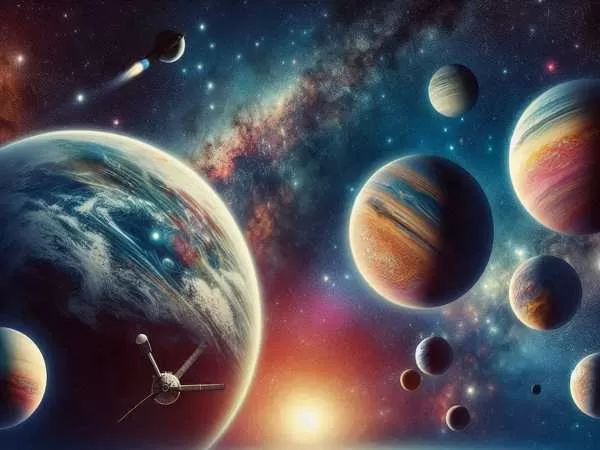Humans are explorers at heart. Our species thrives on challenge, discovery, and the relentless pursuit of the unknown. From the earliest nomads to the modern-day astronaut, we have always looked to the horizon, seeking new frontiers. Space exploration is the ultimate expression of this innate human drive.
The Moon, our celestial neighbor, marks the first significant step on our cosmic journey. We’ve been there before, but it’s time to return with a renewed sense of purpose. By establishing a sustainable lunar presence, we lay the groundwork for deeper space exploration, including the ultimate goal: Mars.
The Red Planet, once a distant dream, is now within our grasp. Sending humans to Mars represents a monumental leap for humankind, demanding technological innovation, international cooperation, and unwavering courage. Beyond Mars, asteroids and other celestial bodies offer valuable resources and scientific opportunities.
But our exploration doesn’t end there. The search for exoplanets, planets orbiting stars beyond our solar system, is a quest to answer one of humanity’s most profound questions: Are we alone in the universe? Discovering Earth-like worlds could revolutionize our understanding of life and our place within the cosmos.
Space exploration is more than just scientific pursuit; it’s a catalyst for innovation. Countless technologies we rely on daily owe their existence to space programs. From medical advancements to communication systems, the benefits are tangible and far-reaching. Moreover, space exploration inspires generations, igniting a passion for STEM education and fostering a global community united by a common goal.
Yet, the allure of space extends beyond the practical. It feeds our imagination, ignites our curiosity, and connects us to something larger than ourselves. Gazing up at the night sky, we are reminded of our place in the universe and the infinite possibilities that await.
As we embark on this cosmic odyssey, we must remember the words of T.S. Eliot: “And the end of all our exploring Will be to arrive where we started And know the place for the first time.” By venturing into the unknown, we deepen our understanding of our own planet and our role in the grand tapestry of existence.
The journey ahead is fraught with challenges, but the rewards are immeasurable. Humans will return to the Moon, conquer Mars, and venture beyond, driven by an insatiable thirst for knowledge and a profound sense of human potential. The cosmos awaits, and we are ready to answer its call.
Why Explore Space?
Space exploration is a pursuit driven by both practical and philosophical motivations. Here are some of the key reasons:
Scientific Discovery and Knowledge
- Understanding the Universe: Space exploration helps us unravel the mysteries of the cosmos, from the birth of stars to the existence of black holes.
- Search for Extraterrestrial Life: The quest to find life beyond Earth is one of humanity’s greatest endeavors, and space exploration is our primary tool.
- Climate Change and Earth Observation: Studying Earth from space provides valuable data on climate change, natural disasters, and resource management.
Technological Advancement
- Innovation: Space exploration drives the development of new technologies that often have applications in our everyday lives.
- Economic Growth: The space industry creates jobs and stimulates economic development.
- International Cooperation: Collaborative space missions foster international cooperation and diplomacy.
Inspiration and Global Unity
- Inspiring Future Generations: Space exploration ignites imaginations and encourages young people to pursue STEM careers.
- Global Unity: Shared achievements in space can unite people from different cultures and backgrounds.
Long-Term Human Survival
- Resource Scarcity: Earth’s resources are finite, and space exploration could provide access to new resources.
- Planetary Defense: Understanding asteroids and comets can help us protect Earth from potential impacts.
- Colonization: In the distant future, space exploration could lead to the colonization of other planets, ensuring the survival of humanity.
Ultimately, space exploration is a testament to human curiosity, ingenuity, and our desire to push the boundaries of what is possible. It is an investment in our future, both as individuals and as a species.

